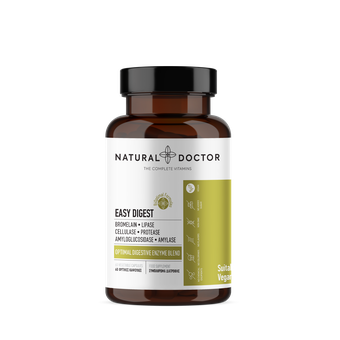How to relieve bloating and indigestion?

Many people experience painful digestive disorders such as heartburn, indigestion, reflux, and bloating. These discomforts are usually followed by moderate to severe pain and subside within a few minutes or, in some cases, several hours
Heartburn is often a symptom of gastroesophageal reflux disease, a disorder characterized by an upward movement of stomach acids to the esophagus.
When you know what foods cause this reaction, you can avoid them. But for many people, no matter what they eat, indigestion or heartburn is inevitable. Sometimes, it is easy to identify which foods or drinks caused the problem and avoid them. According to a published study, limiting the consumption of simple carbohydrates, i.e., spaghetti, rice, sugar, white bread, significantly improves gastroesophageal reflux and its symptoms.
Unfortunately, there is no quick and immediate solution, and it requires regular discipline and a shift to healthier habits. Besides, it will take time to realize the benefits that the following simple and natural solutions can have to apply in everyday life.
Causes of digestive disorders
- Obesity
- Smoking
- Spicy foods
- Fried foods
- Fatty foods
- Increased consumption of simple carbohydrates
- Consumption of alcohol & soft drinks
- Consumption of fruits and fruit juices
- Late night meals
- Malabsorption
What exactly can you do to naturally manage and control the unpleasant symptoms of digestive dysfunction such as bloating, indigestion, and reflux? First of all, consult your doctor to ensure that these are not colitis or irritable bowel syndrome symptoms.
What to do:
- Avoid drinking liquids at least one hour before and after eating
- Avoid lying down 2 hours after lunch or dinner
- Do not wear tight clothes, especially in the middle, but loose
- Avoid lifting heavy objects 2 hours after eating
- Maintain a healthy weight
- Avoid eating for at least 2 hours before bedtime
- Avoid excessive consumption of simple carbohydrates and sugar
- Supplement your diet with digestive enzymes
Foods to avoid
- Chocolate
- Coffee
- Tea
- Soft drinks
- Alcohol
- Fruit juices
- Spices
- Sugar
- Processed foods
- Simple carbohydrates
The role of enzymes
There is an old Latin expression, "sine qua non," which translates as "without it, there can be no existence." When it comes to digestion and nutrition, digestive enzymes can be the most critical "sine qua non." Digestion is a vital process in which the food we eat is broken down so that the body can use it. Digestive enzymes are enzymes that participate in digestion and help breakdown food into its components and absorb their nutrients.

Digestive enzymes are divided into three major categories based on the food's nutrients, which they break down. Thus, there are digestive enzymes that break down:
- carbohydrates
- fats
- proteins
Enzyme deficiency can cause poor digestion and low absorption of nutrients. This results in indigestion, such as bloating in the stomach or abdomen and reduced absorption of nutrients. Our nature is made so that we consume foods that contain enzymes, and we chew them well so that they mix with the saliva, which is also rich in enzymes.
Foods rich in enzymes are:
- pineapple
- papaya
- kefir
- ginger
- mango︎ ︎
Digestive enzymes are the catalysts involved in the breakdown and absorption of food. Adding digestive enzymes to the diet helps the body better assimilate the nutrients of the food. They help in the processes of digestion as well as in conditions of bloating and indigestion.
Lipase
Lipase is an enzyme necessary for the digestive system. Its name, of course, comes from the Greek word fat, and its primary function is to break down body fat into smaller, digestible elements to facilitate the digestive process.
Cellulose
Ιn order to digest appropriately plant foods such as greens and vegetables, the body needs a particular enzyme which it can not produce, cellulose. Cellulose allows the absorption of vital nutrients, breaks down fibre, and increases plant foods' nutritional value.
Protease
Compared to lipase and amylase, which break down fats and carbohydrates, protease breaks down protein into amino acids. The body then uses amino acids for optimal energy. According to studies, protease benefits in cases of indigestion and bloating.
Glucoamylase
The enzyme glucoamylase is responsible for breaking down starches into sugar. Then sugar becomes an energy source for the body. A recent study showed that glucoamylase also aids digestion and reduces bloating.
Bromelain
Bromelain is an enzyme found in the nuts and stems of the pineapple. It can help the body absorb complex proteins. Bromelain is also supported by many studies on its positive effect on irritable bowel syndrome, indigestion, and heartburn. Also, it helps balance the acidity of the stomach.
Amylase
The breakdown of sugars, starches, and carbohydrates requires the presence of amylase. Many common symptoms can be a sign of amylase deficiency. When the body does not produce digestive enzymes such as amylase, it may experience bloating and indigestion symptoms.
The nutritional supplement EASY DIGEST includes digestive enzymes of plant origin to support digestive function and is created by clinical scientists. It is free of chemical additives such as artificial colours, artificial flavours, titanium dioxide, milk, wheat, yeast, soy, or genetically modified organisms.



